"Study abroad isn't all studying"
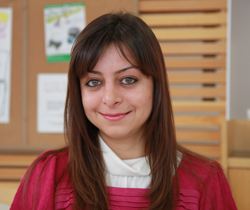
Name: Gul Cakmak
Age: 24
Nationality: Turkish
Program: HUSA (Hiroshima University Study Abroad) (4th year student)
Hobbies: Swimming, reading, travel, photography
In this edition of "Voices", I interviewed Gul, HU's first HUSA exchange student from Turkey. Despite only being in Japan for a year, Gul has done more than most students could in 2 or 3! From homestays to travel, and even working part-time as a guide to Miyajima (which landed her on TV!), she has certainly been keeping busy. But what drew her to Japan to begin with? And why was she on TV? The answers and more in this month's edition of Voices from Abroad!
Thank you for allowing me to interview you today. Let's get started. First, what motivated you to study abroad in Japan?
I studied Japanese for 5 years at my home university, but never used Japanese outside of class. So I thought that if I came here (Japan), I would be able to use Japanese on a daily basis, so here I am. You can't get better at a language if you don't actually speak it, after all.
That's right. So why did you choose Hiroshima University?
I'm actually the very first Turkish participant in the HUSA program (laughs). I first applied to enter the Masters program at a different university, but since there were a limited number of seats, I unfortunately was unable to get in. It got me down, but it actually turned out to be my chance to come to HU, and I enrolled in the HUSA program. I also studied abroad once before in Japan prior to HUSA. During one of the exchanges, I had the chance to visit Hiroshima University, and I really thought it was a great place, so I was able to come here without any doubts.
I see. So what do you think of the HUSA program?
I really like it. I was kind of nervous and worried at first though (laughs). Looking at the pamphlets and information on HUSA, there were a lot of Americans and Asian students who participated. There weren't very many people from Europe, let alone Turkey! When the international students gather, we all speak English, but when you have a problem, most of them go to others from their country and speak in their native tongue about it.
But since I was the only one from Turkey, I wondered what I should do if I had an issue I needed to talk about. But, I made lots of friends from all different countries, and by talking and going to eat with them, I learned so many things. In fact, I learn something new almost everyday! (laughs)
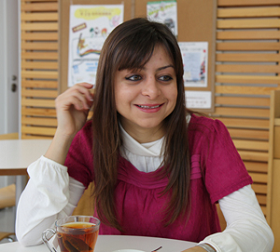
"I really like it!"
That's great to hear. So what got you interested in studying Japanese?
In Turkey, 1st year high school students all take the same liberal arts curriculum. However, in our second year, we start to study topics we're interested in more in-depth. I chose Languages as my topic. At that time, I started studying English, and took my university entrance exam in English. I had been study English since middle school, but I didn't want to become an English teacher as a profession. So when I started university, I wanted to study lots of different languages. However, since English is something of a common world language, I was hesitant in my choice. At the time, the relationship between Turkey and Japan was getting stronger, and I was really drawn to Japanese culture and to kanji (Chinese characters), so I decided to study Japanese. However, after 5 years of studying English, suddenly switching to Japanese was a shock to many people (laughs). I was criticized by people asking what I was going to do with Japanese once I graduated, but now, many of those people are saying they wish they had studied Japanese, since it's a big asset in getting hired by Japanese companies in Turkey.
Looks like you made the right choice (laughs). Do you feel your Japanese has improved since coming to Japan?
Definitely. I study Japanese in classes, but most often my real studying takes place off-campus (laughs). Just traveling around Japan and using Japanese on an everyday basis is a really effective way to study. Before I came to Japan, I would always get really nervous when I had to use Japanese and nothing came out right, but now, I can speak just fine, so I think I've improved.
You said previously you had been to Japan before, but what impressions did you receive from each of your trips?
I wasn't really too surprised by anything here since I had taken classes on Japanese culture and society in Turkey. In my program in Turkey, there was one Turkish professor who had lived in Japan long-term who often told me about their experiences in there. Thanks to this, I was able to adjust well. But I did always have a good impression of Japan (laughs). However, when compared with my hometown, Saijo really is out in the countryside (laughs). Despite that though, the campus here is huge and there are so many students...I'm surrounded by all of my friends here and every day is really fun, so I don't mind that it's far from the city. But during the New Year, I just stayed in Saijo, unlike my friends. It was then that I really started to feel like the countryside is a lonely place (laughs). I really wish campus was in the city (Hiroshima City).
Friends become like family for international students, so I can imagine. So what kinds of experiences have you had as an international student here?
I've had so many experiences, like going to festivals with friends and teachers, going on homestay programs...if there's an event going on, I always sign up! (laughs). The homestay in particular was really fun! My homestay family had small children, so we played together and had a really great time -- even if I thought the program was a little too short (laughs). We only had 2 days with them. When I was a 2nd year student at my university in Turkey, I also had the chance to go on a homestay program in Japan -- in Hiroshima City even! (laughs). Even after I returned to Turkey, I regularly kept in touch with my homestay family. So when I was going to come to Hiroshima, they told me to come and see them. Since the campus is close to the city, I would go stay with them for 2 or 3 weeks. They became like a second family to me. I even call my homestay family parents "Mom" and "Dad" (laughs). Thanks to them, my family in Turkey let me come to Japan without worrying too much about me, and I don't really get homesick, since I know if anything happens, my second Japanese family will be there to help me.
Sounds like you met a really nice family. Changing the subject however, how was it the first time you came to HU? Were you nervous?
I wasn't really too nervous since there are 42 other students in the program, and my tutor supports me. But, I did have trouble deciding how to spend each day. I had so many things to do that it was hard to choose! (laughs). But I was really busy running around in the beginning. I came to Hiroshima by myself from Kansai Airport, stayed the night in Hiroshima City, and then went to the dorm by taxi the next day. Usually student tutors come and pick up new students, but my tutor was really busy, so we decided to meet at the dorm for orientation. Plus, buying necessities for my life here was a big task in itself! And it wasn't just that, my room also needed a good cleaning. I was so surprised at everything that I started crying (laughs). But I went shopping with a Japanese student, bought cleaning supplies and everything else that I needed and got right to cleaning! When the room was clean, I bought cute things to decorate and my room was transformed into a livable space, but I was pretty doubtful about it at first (laughs).
Do you do your own cooking at the dorm?
Our dorm kitchen is sort of an issue, so I usually just eat out. Sometimes I do my own cooking, but then it's just me eating alone. If I eat out, I can talk to my friends, which is much more fun than eating alone! They have a lot of different restaurants, so I eat lots of different foods like okonomiyaki, curry, sushi... In Turkey, I would often eat with my family, but when I started university, I lived in a dorm. It was around that time that I started to eat out more often. I might eat out a lot, but I also often make food from my country and eat together with other international students. Just recently I made typical Turkish food for 7 international students. I made lots of different dishes so that they could get a taste of Turkey -- it was really fun! I even used ingredients that I had my family send from Turkey especially, so they could experience authentic Turkish flavors. Everyone said it was really good, so I was pretty happy (laughs).
I want to try Turkish food too! (laughs) Going back to a previous topic, you said that you were drawn to Japanese culture and kanji. What is it that drew you to them?
Well, I like drawing pictures, so I really like writing kanji. If you think about kanji like drawing a picture, it becomes fun to study, and you remember it better. I also really like Japanese calligraphy. My "Japanese family" Mom is a former calligraphy teacher, so she teaches me how to write and what to do. I've also experienced other traditional Japanese cultural arts. When I was a 2nd year university student, I participated in a Japanese cultural study program, sponsored by the Panasonic Corporation. I experienced ikebana and tea ceremony -- it was really unforgettable! Both are very relaxing. At the end of the program, we had the chance to have lunch with the CEO of Panasonic. Everyone dressed up and were led into a really spacious and elegant room, complete with a red carpet! I was really nervous the whole time, but I will never forget that lunch as long as I live.
Sounds like you have a lot of great memories! So what type of work are you interested in doing in the future? Perhaps a Japanese teacher?
If I can get a scholarship from the Ministry of Education, Culture, Sports, Science and Technology (MEXT), then I would like to continue my studies in Japan. If there's a chance for me to become a Japanese teacher, I would gladly take it, however, I think I would rather work in a Japanese company. I want to make full use of the Japanese I've learned thus far.
You have become fluent after all! Do you have any advice for international students at HU?
Actively try things and get as much experience as you can without being shy or holding back. There are things to be learned in a classroom, but there are also many things you can learn just by interacting with others outside of class. Study abroad isn't all studying. For example, I have never had a part-time job in Turkey. I used to get spending money from my parents, but here, I only have my scholarship to rely on, so I started to look for a part-time job.
It just so happened that at the time, my tutor found a topic on the Momiji online messageboard for students about an ad for part-time sightseeing guides at Miyajima. She suggested that I try and apply for it.
I applied and went for an interview. I passed the first interview despite being nervous, but at the second interview, there were 4 interviewers! My mind went blank! (laughs). When they told me "we'll be in touch", I thought I blew it, and wandered around Hiroshima City, constantly checking my phone. When I received word from them a few days later that I had gotten the job, I absently asked, "Really? You want me??" (laughs). I met a lot of different people at my part-time job, and had the most incredible experience -- one I won't soon forget: I was interviewed by Hiroshima Television!
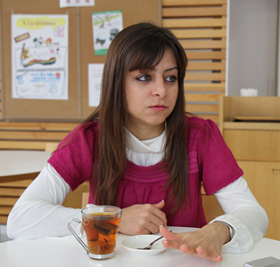
"Actively try things and get as much experience as you can,"
I actually saw that news report (laughs).
The report was on TV and in newspapers -- definitely an unforgettable experience. I was so terribly nervous during taping. All I could think was "what should I say, how should I respond?" It was just Hiroshima Television at first, and I was told that others would be coming the next day, but I didn't really believe them. However, the next day when I went to work, there was a crowd of reporters waiting at the ferry port with cameras, and when they saw me, someone shouted, "It's Gul!" and they all started snapping pictures (laughs). The Japanese people around me looked pretty surprised, like "Who is she? Is she famous?" (laughs). I was followed all day and after the report aired, I got numerous calls from friends saying they had seen me on TV or asking why I was on TV (laughs). After that, there were lots of tourists who would recognize me, like "You're that Turkish guide! I saw you on TV!" and even tourists who ask "Is the Turkish guide here today?" when I'm not working (laughs).
You've become a celebrity it seems! (laughs) What kind of work do you do at your part-time job?
There are two ferry companies at Miyajima Port, so foreign tourists often get confused as to how they're different or how to buy tickets. That's where I come in. I speak English to help them, greet them with "good morning", provide information pamphlets, and help them with anything they need. I also answer questions from Japanese tourists in Japanese, so I basically support the needs of the majority of all tourists who come to Miyajima.
Working as a guide seems the perfect job for someone as cheerful as you! (laughs) Sounds like every day for you is busy but rewarding.
I'm always having fun (laughs).
Well, we've reached the end of our interview; is there any other advice you might have?
I suppose what I want to say is that everyone is nervous and worries before studying abroad. But Japanese people are very kind; if anything happens, they will cooperate with you and help you out. And even if you can't speak Japanese, there are Japanese people and international students who speak English, so I don't think it's much of a problem. So don't be afraid and don't worry -- just come and study abroad in Japan! The best and most unforgettable memories of your life are waiting for you.
That's great advice! Thank you so much, Gul! If you have the chance, please come to Japan again soon!
I will! Thank you!
Photo Gallery
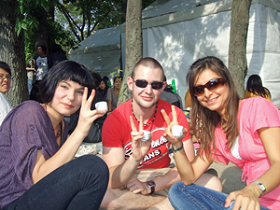
With friends at the Sake Festival.
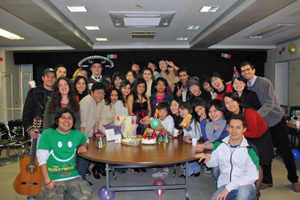
Birthday party for a fellow international student.
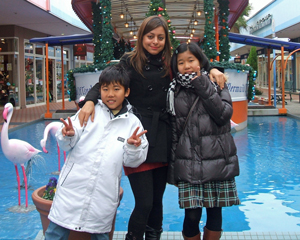
With her homestay family.


 Home
Home